President Lawrence S. Bacow: “I began to let that idea of myself go”
In his baccalaureate address, President Lawrence S. Bacow addressed an anxiety many students probably felt: “After years of amassing options, you are now faced with the prospect of having to exercise them—the act of walking down one avenue and necessarily forsaking others. Making these choices…can be unsettling, because for the first time in your life, you may feel as if your world is narrowing. I’m here to tell you, it’s not.” He then explained why:
After I finished my second year of law school, here at Harvard, I started a summer job at…a law firm. Now, I had spent my entire life up to that point imagining that I would become a lawyer, just like my father. I thought it was what I wanted to do, and I knew it was what my father and other people expected me to do. One afternoon that summer, I was accounting for my billable hours, filling out a time sheet that broke every hour of my workday into six-minute increments—it is what lawyers do.
9:00 to 9:06 – Finalize the deposition of Mrs. Jones
9:06 to 9:12 – Call Dr. Smith to review his expert report
9:12 to 9:18 – Continue to review expert report with Dr. Smith
9:18 to 9:24 – Summarize telephone conversation with Dr. Smith
You get the idea. Now, before I continue, I want to say that the law can be deeply interesting and that that form of practice can be deeply satisfying for many people…. I, however, had a totally different reaction to this experience. In fact, as my pencil hovered over 9:24 to 9:30, that particular window in time (six minutes), my mind offered up a line from the T.S. Eliot poem “The Love Song of J. Alfred Prufrock”: I have measured out my life with coffee spoons;
That line repeated itself to me over and over and over—six minutes, six minutes, six minutes—and I realized that I was doing something because of what other people thought I should do and not, perhaps, what I thought I should do. When the summer ended, I began to let that idea of myself go, and started figuring out how I really wanted to spend the rest of my life.
Was it easy? Absolutely not. My father was not happy that I abandoned the law. In fact…I had to become president of Tufts before my father finally admitted that I made the right decision.
General Mark A. Milley: “You’re to be judged by the content of your character”
At the ROTC Commissioning Ceremony Wednesday morning, General Mark A. Milley, Chief of Staff of the U.S. Army, and President Donald Trump’s nominee as chairman of the Joint Chiefs of Staff, had blunt things to say about the qualities of leadership, within the military in a democracy—and beyond. The new ensigns and lieutenants would need to be extraordinarily competent as part of their obligation to the men and women looking to them not only for personal leadership but for evidence of competence and character. Those troops “don’t want to follow someone who’s immoral, who’s out there doing things like lying, cheating, carrying on….They’re looking to you to have the spine of titanium steel to stand up and do that which is right, even when it’s going to cost you your career…who is not afraid to speak truth to power no matter what the cost will be to yourselves. Someone who is honest, who has standards, and never, never, hides behind his soldiers.”

General Mark A. Milley
Photograph by Jim Harrison
Enlisted personnel, he continued, are also “looking to you to be humble.…” Referring to the ancient Greek concept of hubris, he said, “We see that in our daily lives all over the place: we see that in the military, we see it in politics, we see it in sports, we see it in commercial life.…We see people who really think that they are above everything else.…” Military officers, he noted, “take an oath—an oath that says, ‘I’m willing to die,’ an oath that says, ‘I’m willing to sacrifice’—and it’s not an oath to a king or queen or a dictator or a president or any individual. We don’t do that.…We…do not take an oath to a tribe, a person, a country, or a flag, or an individual. We take an oath to an idea embedded in this document called the Constitution of the United States. And it’s an incredibly powerful idea.…That idea has brought down tyrannies and dictatorships.…The idea that’s embedded in this oath—and that you’re willing to die for—it says that everyone under those colors of red, white, and blue—and that flag—every one of us is born free and equal, and…you’re to be judged by the content of your character, not the color of your skin.”
Teju Cole: “The destination is freedom”
On Class Day, Design School graduates heard Teju Cole, Vidal professor of the practice of creative writing, speak about professional ethics, and doors.
Design is not an intellectual exercise. It comes with ethical burdens. The work you will go on to do from here…will in aggregate be influential. But the question of what kind of influence you will have is up to you. We face challenges and we need you to be a door for us.…There are those who agree to build prisons. There are those who agree to build detention camps. Oppression has always had great use for architects and designers and urban planners. Redlining was a technical skill. And everything that betrays our collective humanity depends on people just like you with skills just like yours.

Teju Cole
Photograph by Maggie Janik/Harvard Graduate School of Design
Fascism in guises large and small requires signage and advertising. It requires vivid design and the architecture of enmity. History assures us that many, many people get swept up in the flood of its seduction. Will you be one of those who refuses to participate? Even when you know that there will be no medals for your refusal? Even when you’re assured that your refusal will only earn you mockery, poverty, or worse? You are the makers. I want to dream for you, and implore of you, a participation in a making worthy of your skills.…
[E]xpertise is not the destination.…The destination is freedom. What can we do to free others …[H]ow do we become a door for others to pass through…to get from here to there?
Chancellor Angela Merkel: “Every change begins in the mind”
Chancellor Angela Merkel drew on the fall of the Berlin Wall to begin telling the graduates and their guests about the possibility of making a better world:
Anything that seems to be set in stone or inalterable can indeed change. In matters both large and small, it holds true that every change begins in the mind.

Angela Merkel
Photograph by Jim Harrison
My parents’ generation discovered this in a most painful way. My father and mother were born in 1926 and 1928. When they were as old as most of you here today, the betrayal of all civilized values that was the Shoah and World War II had just ended. My country, Germany, had brought unimaginable suffering on Europe and the world. The victors and the defeated could easily have remained irreconcilable for many years. But instead, Europe overcame centuries-old conflicts. A peaceful order based on common values, rather than supposed national strength, emerged. Despite all the discussions and temporary setbacks, I firmly believe that we Europeans have united for the better. And the relationship between Germans and Americans, too, demonstrates how former wartime enemies can become friends. It was George Marshall who gave a crucial contribution to this through the plan he announced at the Commencement ceremonies in 1947 in this very place. The transatlantic partnership based on values such as democracy and human rights has given us an era of peace and prosperity, of benefit to all sides, which has lasted for more than 70 years now.…
Changes for the better are possible if we tackle them together. If we were to go it alone, we could not achieve much. The second thought I want to share with you is, therefore, more than ever, our way of thinking and our actions have to be multilateral rather than unilateral. Global rather than national. Outward-looking rather than isolationist. In short, we have to work together rather than alone.
She posed the problem of taking action because it is the right thing to do, or simply because it is possible, and cautioned the graduates not to
… always act on our first impulses, even when there is pressure to make a snap decision. But instead take a moment to stop, be still, think, pause. Granted, that certainly takes courage. Above all, it calls for truthfulness in our attitude toward others. And perhaps most importantly, it calls for us to be honest with ourselves. What better place to begin to do so than here, in this place, where so many young people from all over the world come to learn, research, and discuss the issues of our time under the maxim of truth? That requires us not to describe lies as truth and truth as lies. It requires us not to accept shortcomings as our normality.








